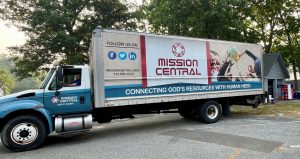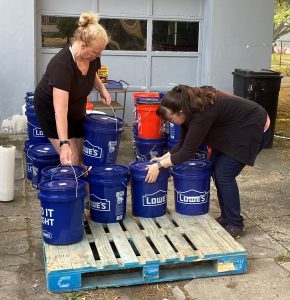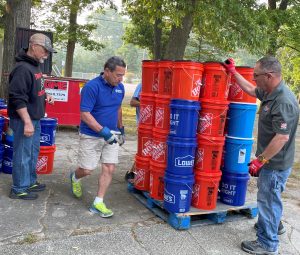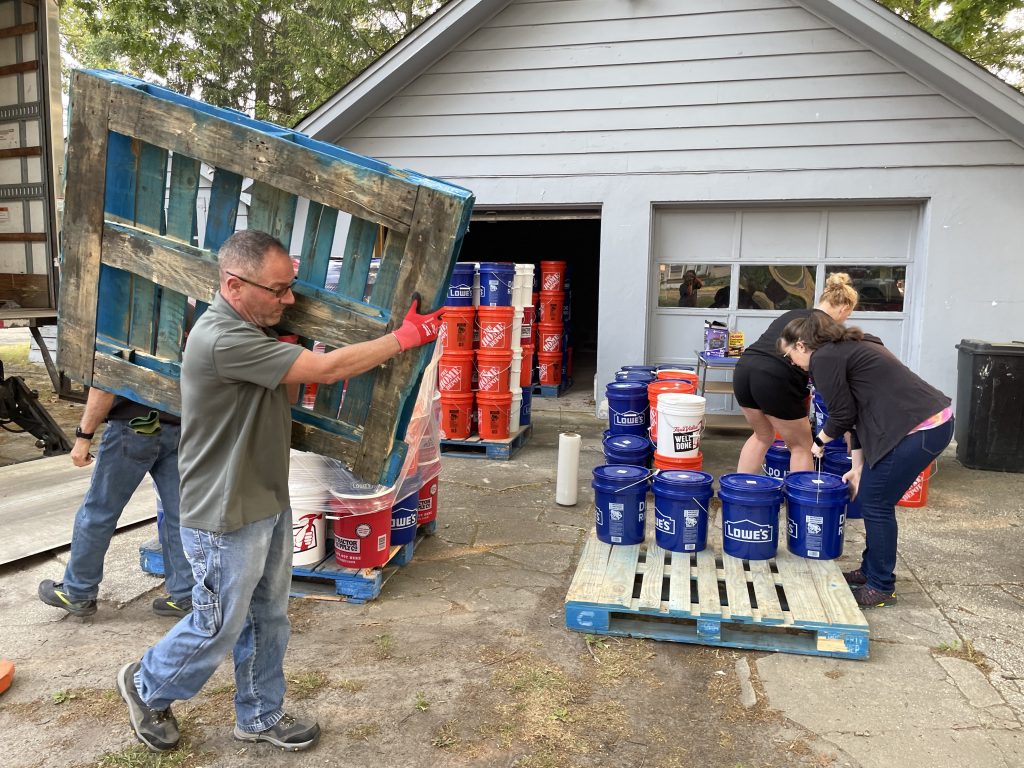Wednesday, June 7, was moving day for Good Shepherd United Methodist Church in Northfield, N.J. They moved 255 buckets with cleaning supplies for flood survivors, plus 1,360 healthcare and hygiene kits, and a handful of computers from their storage rooms.
 It all went onto a large truck for delivery to Mission Central, a depot for relief supplies located in Mechanicsburg, Pa. From there they will be sent to help survivors at future disaster sites through the United Methodist Committee on Relief (UMCOR).
It all went onto a large truck for delivery to Mission Central, a depot for relief supplies located in Mechanicsburg, Pa. From there they will be sent to help survivors at future disaster sites through the United Methodist Committee on Relief (UMCOR).
The church has been receiving and storing donated supplies since the last pickup from Mission Central before the Covid pandemic. That’s because Good Shepherd UMC is the Mission Central Hub in South Jersey—one of two in the Greater New Jersey Conference. It assumed that role in March 2010.
Donations come from individuals, groups and various United Methodist churches, including St. Andrews in Toms River, Central in Linwood, Hopewell, Williamstown, New Dover in Edison and the Long Beach Island (LBI) churches.
Loading the Mission Central truck was a two-hour labor of love performed by volunteers from Good Shepherd and other churches. Some folks stopped by to help that morning on their way to work.
But the church regularly relies on volunteers who come to carefully assemble and package the supplies according to UMCOR’s precise standards, so that they are ready for pickup and shipment to disaster sites when needed.
 “We’ve partnered with a high school Key Club and the VFW auxiliary and gotten help from Boy Scout troops, other youth organizations and even school children who need volunteer hours,” said Good Shepherd’s missions chairperson Michelle Hodac. “Our hub has gone through phases since its inception. People have been very active and involved. Yet, as our membership changes and the congregation ages, the help ebbs and flows. But we do see our youth a lot. They come and go based on their time. It’s their way to connect back to the church.”
“We’ve partnered with a high school Key Club and the VFW auxiliary and gotten help from Boy Scout troops, other youth organizations and even school children who need volunteer hours,” said Good Shepherd’s missions chairperson Michelle Hodac. “Our hub has gone through phases since its inception. People have been very active and involved. Yet, as our membership changes and the congregation ages, the help ebbs and flows. But we do see our youth a lot. They come and go based on their time. It’s their way to connect back to the church.”
The agenda for the church’s monthly “mission nights” alternates between local mission activities and preparing the hub’s donated relief supplies for distribution. Attendance can vary.
“We can have as few as three people on our mission nights, but sometimes we could have 30 people,” said Hodac. Seeing small numbers can be “discouraging,” she said, “but then something happens, people show up, and we feel reinvigorated.”
Hodac inherited this ministry and the passion needed for it from her parents.
“My connection to the hub is very personal. My parents started it,” she said. “My late father, Howard Minnichbach, was very passionate; always a strong believer. When I started to doubt—’Oh, we’re not going to get enough people!’—all of a sudden we’d have 40 people in the room. It’s just God at work and the energy my dad put into it. We lost him right before Hurricane Sandy; and we received a lot of supplies to distribute right after Sandy.”
Her parents–Howard and Rose–were inspired by what they witnessed when doing disaster recovery work with UMCOR in Mississippi after the devastation of Hurricane Katrina. They saw up-close the need for disaster response but also preparation. “I think that’s where he started to catch that fire.”
After starting the hub, they made the six-hour roundtrip to Mission Central each month. “He would do it without hesitation. I think it was just his passion.”

(From left) Greg Troast, Pete LoBianco, the truck driver from Mission Central, and Joseph Antonelli manage a load of flood buckets.
Good Shepherd’s pastor, the Rev. Nicole Troast, also has that passion. “It’s one of my biggest joys and one of the reasons why I’m at this church,” she explained. “I’m from Atlantic City. So, I grew up with flooding and disasters. I started attending this church right after (Hurricane) Sandy because of the mission work they were doing. They put their heart and soul into it. Everybody loves to hear the stuff that’s going on with missions, whether it’s what we do with the hub or in the community or overseas. Whatever it is, they just love being a part of it.”
Troast said members seemed grateful and impressed to see the relief supplies that had filled so much of their space for so long suddenly loaded on a Mission Central truck to be driven away.
“It really takes just a few hands to make a big difference in this world,” said Hodac. “It’s about connecting with the community and encouraging people to come and put their hands to work.”
And now, a once-full storage space is waiting to be filled again.
All photos by Rev. Nicole Troast.

